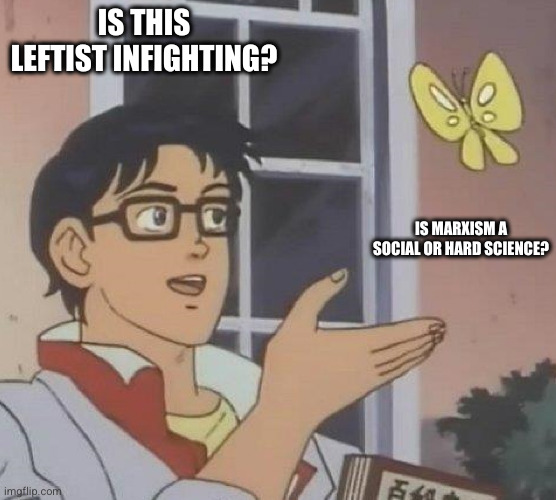Dialectic can never be a science, you can’t apply the same methodology. Even when it’s material.
However it is philosophy, and if your searching for some material reality then it’s ontology.
Science too is a product of ontology, it’s a methodology created for this exact purpose and wich can be studied in this field.
Saying physical properties are social abstractions sounds to me like social constructivism, which is epistemology, again philosophy.
Social sciences can be soft science precisely when they are not dialectic and rely on the methodology of science.
And to be clear, soft science is just a science that is based on a hard science, in which we don’t have enough work done to explain every emergent properties using fundamental properties of matter.
Psychoanalysis is an outdated philosophical theory, so indeed just a scam now.
The Perverts Guide to Cinema is my favorite scam film.
I went on a tear at one point trying to really understand, rigorously (I’m a computer and maths person by trade and training), what dialectics are and how, specifically, the material dialectic (the foundation of Marxist thought!) should work.
I was a bit dissapointed to understand that they can’t really be “rigorous” in that fashion and that they’re really more of a philosophical and rhetorical tool. I do still get a lot of use from them, and in discussions with other people the framework of the dialectic (“Ok, what if we took these two ideas and put them on opposite ends of a spectrum, how does that look?”) is very useful for explaining and expounding upon ideas.
Its usefulness never made me disappointed despite this drawback.
I’m a physicist at heart, which might explains it… To me the use in philosophy is just as important, especially in philosophy of science and metaphysics.
Simply put I couldn’t imagine studying how reality works without ever wandering what it is and how to best study it.
Psychoanalysis is an outdated philosophical theory, so indeed just a scam now.
Quite like Marxism.
In what manner?
In that it’s an outdated economics theory… In fact, it was outdated when it was first published already.
In what way?
In that it ignored the previous half a century of (well tested) advances on the area and just made claims that were already known not to hold on the real world.
Can you for one second elaborate on anything you’re saying? What did Marx ignore, and what doesn’t hold in the real world?
For example, the entire labor theory of value doesn’t hold up on the real world and Economics had already better explanations for the phenomenon it was trying to explain.
You should let China know ASAP 🤣

best meme format ever
Yes it’s one of my favorites too. Happy to see it again, I haven’t seen it in a long time
If you people meme format enthusiasts, would you be interested in a MemeFormat community here on Lemmy?
I would follow it like the psycho girlfriend
That is great to hear
Nice
it’s dialectical :)
Is this dialectics?
Definitely
Honestly, a mistake right off the bat to let him get away with slandering Marxist analysis by tying it to a word as poisoned in the popular imagination as ‘economics’
Why is psychoanalysis bullshit? I’ve seen people talking about it before but I don’t really remember the reasons.
It’s not really very evidence-based from what I remember. Freuds ideas rested on a lot of untested assumptions about the way human psychology works
Psychology student hère.
In short, our professor explained to us that there are two approaches as to how subconscious thoughts and emotions work. The first one is that sometimes thought processes are subconscious, but they can be “brought to light” relatively easily; this perspective has been well-validated and compatible with modern psychology. The second approach is the psychoanalytic one - that some thoughts and emotions are forcefully kept away from the consciousness in order to self-regulate. This position has been debunked and doesn’t seem to have empirical basis.
That’s why classical psychoanalysis today, where you dig deep into thoughts and feelings in order to go beyond the “defensive forces” of the mind (in German also called Abwehr), is seen as outdated.
Im with handlebar head on this one










